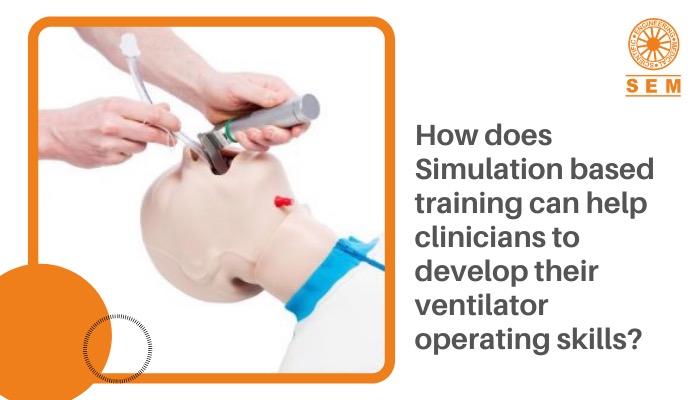How does Simulation-based training can help clinicians to develop their ventilator operating skills?

In the COVID-19 pandemic
As the COVID-19 pandemic took over the whole country, MP’s across the country feared their state would not have enough ventilators to treat severely ill patients. And when they had ventilators available, they lacked human resources to operate them. Simulation-based training was introduced to help new joiners and clinicians to fill those vacancies and make them learn how to become familiar with the ventilators and other types of machinery.
Essentials for Ventilator Management Training
Critical patients with COVID-19 symptoms will often get to be placed on a ventilator to assist them to breathe. When a patient is mechanically ventilated, a Pulmonologist will provide care for them. However, as the number of COVID-19 patients mounted, many hospitals did not have enough staff trained to manage ventilators.
Many hospitals have shifted staff over to their emergency and care departments to provide relief to healthcare workers, who were overworked before the covid – 19 pandemic. The in-depth work of managing the ventilator requires specific training and skills and many clinicians and new joiners can intubate and subsequently mechanically ventilate the patient just because of simulation training.
Healthcare workers who don’t concentrate on critical care medicine or anesthesiology have little experience taking care of ventilated patients. This means that a lot of healthcare workers lack the clinical experience needed to require the care of ventilated patients.
Fortifying Ventilator Skills Through Simulation
Many universities and hospitals are turning to simulation to teach their clinicians and staff to ensure health workers have the talents to figure with ventilators. Simulation enables clinicians to practice employing a ventilator during a wise scenario, developing their knowledge and skills before using them on real people.
As the participants apply their skills and decision-making during a safe clinical environment, they receive feedback from educators. This allows the participants to spot mistakes, learn what went wrong, and improve their performance without putting real patients in danger. The students gain experience while using the ventilator screen simulator and also excel the skills needed to handle their patients.
Furthermore, a study found that residents who completed five hours of simulated ventilation training had an equivalent level of data as those that completed month-long rotations in an ICU. Thus, simulation-based training is often a useful gizmo for teaching ventilator management skills.
Clinicians learn new skills with the help of Simulation sessions.
Participants also incorporate the COVID-19 protocols. By practising the new protocols on a simulator, participants integrate them into their system until they become a manner. As a result, crucial moments for correct infection prevention aren’t missed during patient care, especially during airway emergencies.
Furthermore, since isimulate’s Ventilator Screen Simulation for REALITi360 is often placed on a true ventilator, participants also can find out how to switch the parameters of respiratory mechanics, including resistance, compliance, rate of respiration, etc. based on the simplest course of treatment.
SEM trainers and systems extend training and consultation for operating ventilator screen simulation for REALITi360. The learner can work on placing the patient on a ventilator practice establishing an airway. The scenario based training also allows them to experience a significant number of monitors, defibrillators and ventilators that they might encounter in their EMT or Hospital careers.
Simulation-based training is particularly important now considering the necessity for healthcare workers during this pandemic. As hospitals transition to emergency and important care departments, simulation-based training helps to make sure their capacity to supply care is typically enhanced and never compromised.
